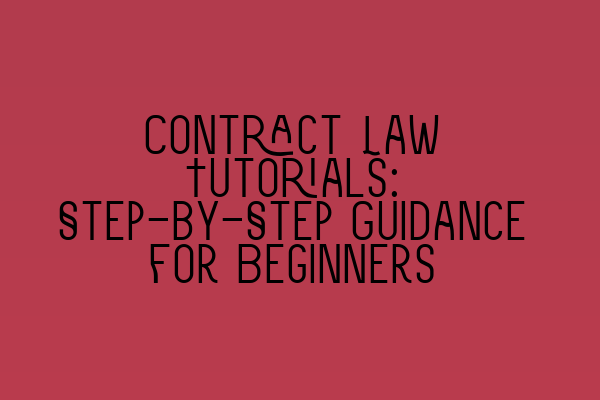Contract Law Tutorials: Step-by-Step Guidance for Beginners
Contract law is a fundamental aspect of legal understanding and practice. Whether you are a law student, solicitor, or just interested in learning more about contracts, having a solid grasp of contract law is essential.
In this comprehensive tutorial, we will guide you step-by-step through the key principles of contract law. From the formation of a contract to its termination, we will cover all the essential elements, rules, and concepts that you need to know.
The Basics: What is a Contract?
A contract is a legally binding agreement between two or more parties. It outlines the rights and obligations of each party and provides remedies in case of a breach. To create a valid contract, certain elements must be present:
- Offer: One party must make a clear and definite proposal.
- Acceptance: The other party must unconditionally accept the offer.
- Consideration: Both parties must exchange something of value (money, goods, services, etc.)
- Intention to create legal relations: The parties must intend to be legally bound by the contract.
- Capacity to contract: The parties must have the legal capacity to enter into a contract (age, mental capacity, etc.)
- Form: Some contracts must be in writing and signed to be enforceable.
Understanding these basic elements is crucial for contract formation. Let’s explore each of them in more detail:
1. Offer
An offer is a definite and precise statement of the terms on which the offeror is willing to be bound. It must be communicated to the offeree and can be either written, oral, or even implied by conduct. However, certain offers, such as those made in advertisements or invitations to treat, may not be legally binding.
For an offer to be valid, it must be clear, certain, and communicated to the intended offeree. Any vague, uncertain, or incomplete offers may not create a legally binding contract.
Interested in practicing your knowledge? Check out our SQE 1 Practice Exam Questions to test your understanding of contract law.
2. Acceptance
Acceptance is the unqualified and unconditional agreement to the terms of an offer. It must be communicated to the offeror and generally follows the same form as the offer (written, oral, or implied). Acceptance must also be made within a reasonable time and before the offer lapses or is withdrawn.
It’s important to note that any modifications or conditions added to the acceptance may be seen as a counter-offer and not a valid acceptance. Therefore, it’s crucial to carefully review the terms of the offer before accepting.
Want to gauge your contract law knowledge even further? Try our SQE 1 Practice Mocks FLK1 FLK2 to gain a better understanding of how contract law works in practice.
3. Consideration
Consideration refers to something of value that is exchanged between the parties. It can be money, goods, services, promises, or even refraining from doing something that one has the right to do. Each party must give something and receive something in return for the contract to be valid.
Note that consideration does not have to be equal in value, but it must be sufficient. If one party promises to give something, but the other party does not promise anything in return, there may not be adequate consideration.
Looking to enhance your skills in contract law? Our SQE 2 Preparation Courses offer in-depth contract law modules designed to give you a comprehensive understanding of the subject.
4. Intention to Create Legal Relations
For a contract to be valid, the parties must intend to be legally bound by its terms. This means that they must have a genuine intention to create legal relations. Certain agreements, such as social or recreational arrangements, may not be legally enforceable due to the lack of intention to create legal relations.
It’s essential to assess the circumstances and intentions of the parties to determine whether there is a genuine intention to create legal relations. Factors such as the presence of formalities, consideration, and the nature of the agreement can help establish this intention.
Interested in preparing for the SQE exams? Our SQE 1 Preparation Courses cover all the essential topics, including contract law, to help you succeed.
5. Capacity to Contract
Not everyone has the legal capacity to enter into a contract. Minors, individuals with mental disabilities, and those under the influence of illegal substances may lack the requisite capacity. If a party lacks capacity, the contract may be voidable, meaning that the affected party can choose to either affirm or disaffirm the contract.
It’s important to ensure that all parties have the necessary capacity to contract. If any party lacks capacity, the contract may be unenforceable and could lead to legal repercussions.
Are you aware of the upcoming SRA SQE exam dates? Stay up to date with the SRA SQE Exam Dates to plan your preparation effectively.
6. Form
While many contracts can be formed orally or through conduct, some contracts require a specific form to be valid. For example, contracts for the sale of land must be in writing and signed by both parties to comply with the Statute of Frauds.
It’s essential to understand the formal requirements for different types of contracts to ensure their enforceability. Failing to meet the necessary form requirements may render the contract unenforceable.
In conclusion, understanding the key principles of contract law is crucial for anyone working in the legal field or even those seeking to learn more about this fundamental area of law. By grasping the elements of a contract, from its formation to termination, you can navigate the complex world of contracts with confidence.
Interested in mastering other areas of law? Check out our wide range of SQE Preparation Courses designed to equip you with the knowledge and skills necessary to excel in the legal profession.
